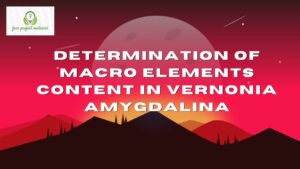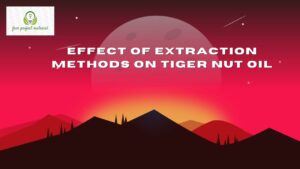ABSTRACT
The effect of Carica papaya extract of natural product for the prevention of corrosion inhibition of mild steel in acidic medium has been investigated. The study was carried out using the weight loss technique. The results obtained show Carica papaya leaves extract and potassium iodide as potential inhibitors of mild steel corrosion in H₂SO₄. the result revealed that the weight loss for the corrosion of mild steel coupons in H2SO4 decrease with increasing concentration of acid, rate of corrosion of mild steel decreases with increase in concentration of the acid and that the leaves extracts and KI inhibits. The corrosion of mild steel in H2SO₄ via adsorption of the inhibits molecules on the metal surface. The surface coverage (Ө) of the plant extracts increase with increase in the concentration of the extract. The inhibition efficiency of the extract increases with the increase in the concentration of the extracts. The best result was obtained with 100ml of carica papaya leaves extract and KI as inhibitors with an inhibition efficiency of (59%).
TABLE OF CONTENTS
Contents – – – – – – – – –
Title page – – – – – – – – –
Certification – – – – – – – –
Dedication – – – – – – – – –
Acknowledgments – – – – – – –
Abstract – – – – – – – – –
Table of contents – – – – – – – –
CHAPTER ONE
INTRODUCTION – – – – – – – –
1.1 Background of the Study – – – – – –
1.2 Aim and Objective of Study – – – – – –
1.3 Scope and Limitation of The Study – – – –
1.4 Definition of Terms – – – – – – –
CHAPTER TWO
2.0 Literature Review – – – – – –
2.1 Overview of corrosion – – – – – –
2.2 Factors Affecting corrosion – – – – – –
2.3 Types of corrosion – – – – – – –
2.4 Examples of corrosion mitigation challenges – – –
2.5 corrosion prevention process – – – – –
2.6 Corrosion prevention process – – – – –
2.6.1 Synthetic organic corrosion inhibitors – – –
2.6.2 Plant extracts as a corrosion inhibitors for mild steel –
2.7 Plant extract as corrosion inhibitors – – – –
CHAPTER THREE
MATERIALS AND METHODS
3.1Sample collection – – – – – – –
3.2 Equipment used/ Reagent – – – – – –
3.3 Sample preparation – – – – – – –
3.4 Preparation of 0.5M HCl – – – – – –
3.5 Gravimetric method – – – – – – –
CHAPTER FOUR
RESULTS AND DISCUSSION
4.1Results – – – – – – – – –
4.2 Effect of studied inhibitors on the weight loss – – –
4.3 Corrosion Rate and inhibition Efficiency – – –
CHAPTER FIVE
CONCLUSION AND RECOMMENDATION
5.1 Conclusion – – – – – – – –
5.2 Recommendation – – – – – – –
References
CHAPTER ONE
1.0 INTRODUCTION
1.1 Background of the Study
The technological advancement in the modern age leads to serious engineering problems called corrosion. Many efforts were made to bring under control the onset and thereafter critical effects of corrosion using many preventive measures. Out of several methods, inhibitors usage is one of the most realistic methods of controlling the corrosion, particularly in aggressive media. In order to reduce the rate of corrosion generally, the inhibitors are used. A variety of compounds both inorganic and organic are used as inhibitors for metals corrosion in different aggressive media. However many researchers (Bethencourt et al., 1998) reviewed the work on the mechanism of corrosion inhibition and other researchers (Kasavan et al., 2012) consolidated the work carried out on the effectiveness of green inhibitors (Sangeetha et al. 2011). Some researchers have reviewed the work on utilization of plant sources in corrosion protection. (Speller 1935) is the first researcher who identified the inhibition performance of corroded scaled water pipes in the hydrochloric acid medium using organic inhibitor. A variety of heterocyclic compounds have been accounted as inhibitors for corrosion and still the testing of new synthetic heterocyclic compounds is being persisted (Larenee et al., 2011). In spite of the potential reports on many inhibitors, most of these inhibitors for corrosion are not only expensive but also nonbiodegradable. This has lead to the search for their replacement. In recent days many rare earth elements and organic compounds have been developed an alternative eco-friendly corrosion inhibitor. During the 1930’s the dried seed, stems and leaves extracts of Celandine and other plants were used in H2SO4 pickling. Proteins from meat and milk were also utilized for reducing the rate of acid corrosion. Yeast, molasses, bran, flour and vegetable oil were also used as an inhibitor for metal corrosion. Starch and tars and oils were also used retard the corrosion in acidic media. Researchers who got first patented for flour, yeast, etc. as corrosion inhibitors (Choi et al., 2001) or and also received patent rights for the byproducts obtained from food industries in order to prevent the iron corrosion in acid media (Balwin, 1895) is the researcher who got (Zakvi and Mebta, 1988). Studied the inhibition on corrosion on steel by sweetie angusfolia in acid media by PDP and LPR techniques were employed in the potentiostic mode of study the rate corrosion exposed to hydrogen-saturated for Ms in acid solution. They werE observed that the efficiency of the inhibitors raised up to 0.3gbm.3 similarly,. Pomegranate alkaloids used as an inhibitor for Ms corrosion in H2SO4 BY (Aymen and Singh, 1991). Using the techniques such as galvonostatic polizarization and mass loss measurement from lower to elevated temperatures. It was observed that the alkaloids of pomegranate show a lower efficiency of elevated temperatures.
1.2 Aim and Objectives of the Study
The aim of this research work is for quality assessment of natural product (extract of the leave of Carica papaya) for the prevention of corrosion with the following specific objective.
To prepare the natural product for the prevention of corrosion
To assess the effectiveness natural product for the prevention of corrosion
To make useful recommendation base on the findings of this study.
1.3 Scope and Limitations of the Study
This research work is carryout to investigate the use of natural product in the prevention of corrosion this work is limited to the use of leaves of Carica papaya only for the assessment as a result of time and financial constraints.
1.4 Definition of Terms
Corrosion: Corrosion can be define as the process through which refined metals are converted into more stable compounds such as metal sulfides or metal hydroxides. The resulting iron involves the formation of iron oxides via the action of atmospheric moisture and oxygen.
Corrosion inhibitor: A corrosion inhibitor is a substance which added in small concentration rates of metal exposed to that environment.
Mild Steel also known as plan carbon steel, is the most common form of steel because its price is relatively low, whole it provides materials properties that are acceptable for many applications.
Natural product: this are product and materials that are obtained naturally from the environment.


